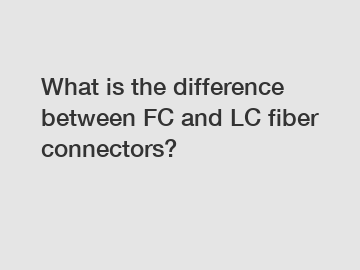What is the difference between FC and LC fiber connectors?
When it comes to networking and data transmission, fiber optic technology plays a crucial role. It enables high-speed communication over long distances, making it an essential component in various industries. Within fiber optic systems, connectors play a pivotal role in ensuring seamless connectivity and transmission. However, not all fiber connectors are the same. In this article, we will explore the difference between two commonly used fiber connectors: FC and LC.
Fiber optic connectors, in simple terms, are the interface that connects fiber cables to other devices such as transceivers, switches, or patch panels. They are designed to ensure precise alignment of the fiber cores, minimizing loss and maximizing signal quality. Among the numerous types of fiber connectors available, FC (Ferrule Connector) and LC (Lucent Connector) are widely used in different applications.
First, let's delve into FC connectors. FC connectors were among the earliest types of fiber connectors introduced into the market. They have a threaded coupling mechanism, which means the connector is securely fastened to the adapter by twisting it. This design offers excellent stability and ensures minimal signal loss. FC connectors are often used in applications where reliability is a top priority, such as telecommunication networks, industrial environments, and research facilities.

The FC connector features a cylindrical ferrule at the end of the connector, which holds the fiber core in place. It is designed to work with single-mode fibers, which are ideal for long-distance transmission due to their low dispersion and attenuation properties. The FC connector is known for its robustness and durability, making it highly reliable in demanding environments. However, the threaded mechanism can be time-consuming and requires proper alignment during connection.
Now, let's shift our focus to LC connectors. LC connectors are smaller and more compact than FC connectors, making them popular in applications where space optimization is essential. They feature a push-pull latching mechanism, allowing for quick and easy connections. The LC connector is widely used in data communication networks, including local area networks (LANs), data centers, and high-density environments.
The primary advantage of LC connectors lies in their versatility. They are compatible with both single-mode and multi-mode fibers, which provides flexibility in network design and deployment. Moreover, LC connectors offer low insertion loss and high return loss, ensuring clear and reliable transmission. Due to their smaller form factor, LC connectors are often used in high-density applications and modular patching systems.
While FC and LC connectors differ in their design and mechanism, both provide reliable and efficient fiber optic connections. However, depending on your specific requirements and application, one may be more suitable than the other. Factors such as space constraints, network type, and transmission distance play a crucial role in determining the ideal connector.
In summary, FC and LC fiber connectors are two commonly used types of connectors in fiber optic networks. FC connectors have a threaded mechanism, offering excellent stability and reliability. They are often used in applications where robustness is essential. On the other hand, LC connectors feature a push-pull latching mechanism, making them compact and easy to use. They are widely used in high-density environments and provide flexibility in network design. Ultimately, the choice between FC and LC connectors depends on the specific needs of your network.
In conclusion, understanding the differences between FC and LC connectors can help you make an informed decision when it comes to selecting the appropriate connector for your fiber optic network. Both connectors offer reliable connectivity, but their design and applications vary. By considering factors such as space optimization, network type, and transmission distance, you can choose the connector that best aligns with your requirements. Whether it is FC or LC, these connectors play a crucial role in ensuring seamless communication and data transmission in the ever-evolving world of fiber optics.
Are you interested in learning more about Copper Cable Supplier, Multichannel Audio Cable Manufacturer, Indoor Single-Mode Multi-Core Optical Cables? Contact us today to secure an expert consultation!
172
0
0


Comments
All Comments (0)